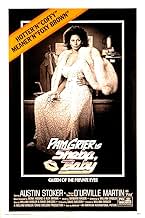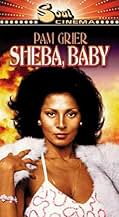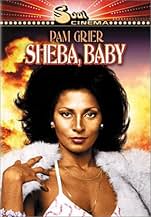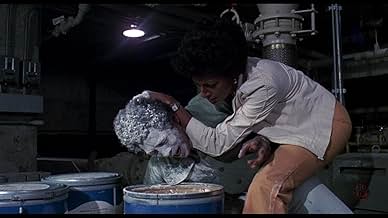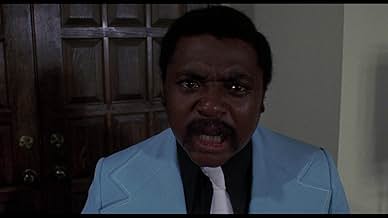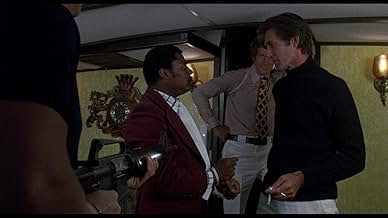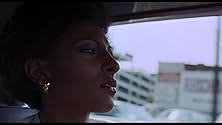NOTE IMDb
5,6/10
2 k
MA NOTE
Ajouter une intrigue dans votre langueA Chicago private detective returns back home to Louisville, Kentucky, to help her father fight mobsters.A Chicago private detective returns back home to Louisville, Kentucky, to help her father fight mobsters.A Chicago private detective returns back home to Louisville, Kentucky, to help her father fight mobsters.
- Réalisation
- Scénario
- Casting principal
Richard Merrifield
- Shark
- (as Dick Merrifield)
Maurice Downs
- Killer
- (as Maurice Downes)
Edward Reece Jr.
- Racker
- (as Edward Reece)
Avis à la une
A Chicago private detective (Pam Grier) returns back home to Louisville, Kentucky, to help her father fight mobsters.
This film was the pet project of director William Girdler, who had already made "Three on a Meathook" (1972) but had yet to make his better known films, "Grizzly" (1976), "Day of the Animals" (1977) and "The Manitou" (1978). During filming, Girdler was only 28... and he would end up dying in a helicopter crash at age 30. (One assumes that had he lived, he would have been a major force in the 1980s.)
Writer David Sheldon was given the task of writing a script for Pam Grier that was less edgy than the movies Jack Hill had been making. He wrote "Honor" almost literally overnight, which was transformed into "Sheba, baby" by the PR department, and Sheldon was also put on as a producer. This was a huge promotion for Sheldon, who had been at AIP as Larry Gordon's assistant (and later "director of development", which essentially means script reader).
For me, the blaxploitation subgenre is an interesting one -- did people dress like this? Now, I did not live through the 1970s nor did I grow up in a big city. But I feel like the "pimp" clothes and similar styles were more likely created in the movies and adopted in real life than the other way around. What is especially interesting is that most of the people involved in the subgenre were white... so this was very much how the black community was perceived rather than how it actually was.
One exception to this in "Sheba" might be the character of "Killer", played by Maurice Downs. Downs was a gangster and heroin dealer in real life, and somehow got mixed up with Sheldon and Girdler. He was also in their follow-up, "Project: Kill" and helped produce it. Tragically (but not surprisingly), he was shot to death outside a restaurant a few years later in true gangster fashion.
"Sheba, Baby" was a major hit in theaters, even though it is often cited as one of Pam Grier's weaker vehicles when compared to her similarly themed action films "Coffy" and "Foxy Brown" (both made by Jack Hill for AIP). This is fair, and it certainly lacks any iconic moments that really burn into a viewer's mind.
Despite this being a second or third tier film, it remains an important part of Grier's career, as well as Girdler's career, and there seems to always be a new generation of fans searching out every last AIP picture. Arrow Video has wisely picked this one up and given it the star treatment.
The Arrow disc has not one, but two audio commentaries. One with writer-producer David Sheldon, which offers incredible insight on AIP, Pam Grier and even legendary director Jack Hill. Heck, some of his detours are more interesting than his recollections of "Sheba", such as how he clarifies that "Grizzly" was not technically a "Jaws" ripoff because "Jaws" had not been released at that point. Heck, even Sheldon's involvement in "Last House on the Left" is discussed!!
We also have an in-depth retrospective on Pam Grier's time at AIP. Did you know that Grier was working as a switchboard operator before being discovered by Roger Corman and Jack Hill? Amazing!
This is an absolutely MUST-OWN disc for any fan of AIP.
This film was the pet project of director William Girdler, who had already made "Three on a Meathook" (1972) but had yet to make his better known films, "Grizzly" (1976), "Day of the Animals" (1977) and "The Manitou" (1978). During filming, Girdler was only 28... and he would end up dying in a helicopter crash at age 30. (One assumes that had he lived, he would have been a major force in the 1980s.)
Writer David Sheldon was given the task of writing a script for Pam Grier that was less edgy than the movies Jack Hill had been making. He wrote "Honor" almost literally overnight, which was transformed into "Sheba, baby" by the PR department, and Sheldon was also put on as a producer. This was a huge promotion for Sheldon, who had been at AIP as Larry Gordon's assistant (and later "director of development", which essentially means script reader).
For me, the blaxploitation subgenre is an interesting one -- did people dress like this? Now, I did not live through the 1970s nor did I grow up in a big city. But I feel like the "pimp" clothes and similar styles were more likely created in the movies and adopted in real life than the other way around. What is especially interesting is that most of the people involved in the subgenre were white... so this was very much how the black community was perceived rather than how it actually was.
One exception to this in "Sheba" might be the character of "Killer", played by Maurice Downs. Downs was a gangster and heroin dealer in real life, and somehow got mixed up with Sheldon and Girdler. He was also in their follow-up, "Project: Kill" and helped produce it. Tragically (but not surprisingly), he was shot to death outside a restaurant a few years later in true gangster fashion.
"Sheba, Baby" was a major hit in theaters, even though it is often cited as one of Pam Grier's weaker vehicles when compared to her similarly themed action films "Coffy" and "Foxy Brown" (both made by Jack Hill for AIP). This is fair, and it certainly lacks any iconic moments that really burn into a viewer's mind.
Despite this being a second or third tier film, it remains an important part of Grier's career, as well as Girdler's career, and there seems to always be a new generation of fans searching out every last AIP picture. Arrow Video has wisely picked this one up and given it the star treatment.
The Arrow disc has not one, but two audio commentaries. One with writer-producer David Sheldon, which offers incredible insight on AIP, Pam Grier and even legendary director Jack Hill. Heck, some of his detours are more interesting than his recollections of "Sheba", such as how he clarifies that "Grizzly" was not technically a "Jaws" ripoff because "Jaws" had not been released at that point. Heck, even Sheldon's involvement in "Last House on the Left" is discussed!!
We also have an in-depth retrospective on Pam Grier's time at AIP. Did you know that Grier was working as a switchboard operator before being discovered by Roger Corman and Jack Hill? Amazing!
This is an absolutely MUST-OWN disc for any fan of AIP.
In comparison to classics like "Foxy Brown" or "Coffy" this one obviously looses, but the film itself is not that bad as some people claim! Okay, it maybe looks more like the episode of a 1970s TV serial than a movie for the big screen, but it has got some decent entertainment values, although the above mentioned films were more violent and sexy. Once more Pam Grier plays a revenging lady which does away with some corrupt guys who killed her father. This amazing main actress it definitely the coolest Afro American actress on our planet and it´s a shame that she´s nowadays wasted in quite meaningless stuff like John Carpenter´s "Ghosts of Mars"! Another memorable part is given by Austin Stroker, a forgotten 1970s actor, who was great in films like "Assault on Precinct 13" (Made in the times when Carpenter still shot good movies...) or "Battle for the Planet of the Apes". Better watch "Foxy Brown" or "Coffy" first to see some real Pam Grier Blaxploitation classics, but you can easily check out "Sheba, Baby" without that feeling to have your time wasted!
Not as good as Coffy or foxy brown but it was entertaining. Pam Grier is the standout in this movie. Action sequences could have been sharper..
Lesser Pam Grier blaxploitation movie has Pam as Sheba, a tough private investigator who returns to her hometown of Louisville, KY to fight mobsters who are pushing her father around. While there she finds time to romance Austin 'Assault on Precinct 13' Stoker. Less gritty and sexy than Grier's blaxploitation classics Foxy Brown and Coffy. The acting is wooden, the direction amateurish, the action slow, and the dialogue lacks punch. None of this is uncommon with blaxploitation films, but this one is lacking the sex, violence, and colorful language that usually spackles over the cracks in these things. The film being shot on location in Louisville does add some authenticity and local flavor, which helps. The movie is propped up mostly just by Grier's screen presence. So completists will want to see it for sure. Those expecting something with a little more spice to it are likely to be disappointed.
Sheba Shayne (Pam Grier) receives a telegram informing her that her father may be in trouble. Sheba, a private investigator and former cop, goes to her father's aid. But someone will stop at nothing to run her father out of business. An attempt to show their muscle goes awry and Sheba's father is gunned down in cold blood. These guys have messed with the wrong woman.
If I had to describe Sheba Baby, the best I can come up with is Pam Grier Lite with some really bad acting. For a Pam Grier film, Sheba Baby is incredibly tame. It's nowhere near as violent as some of her earlier films. Gone are the over-the-top images of Pam placing a small revolver or razor blades in her afro. Pilot (D'Urville Martin) and his crew can't hold a candle to some of the real villains Pam faced in her previous movies. It's strictly by-the-numbers and almost has a made-for-TV feel. As for the bad acting, the baddies that Pam faces off with are as unnatural sounding in their delivery as I've seen. As a result, characters like Pilot don't come across as threatening as they should or need to for the movie to work.
That's not to say there aren't moments or elements in Sheba Baby that I didn't enjoy (Pam in a wetsuit and Pam brandishing a spear gun), it's just that when compared with Pam's other films like Coffy, Foxy Brown, and even Friday Foster that the movie fails.
One final observation - maybe I'm just more sensitive to these things post-9/11, but I don't remember a time, even in the security lax 70s, when you could take a suitcase full of guns on an airplane. When Sheba flies to her father's aid, she's got an arsenal packed in her luggage!
If I had to describe Sheba Baby, the best I can come up with is Pam Grier Lite with some really bad acting. For a Pam Grier film, Sheba Baby is incredibly tame. It's nowhere near as violent as some of her earlier films. Gone are the over-the-top images of Pam placing a small revolver or razor blades in her afro. Pilot (D'Urville Martin) and his crew can't hold a candle to some of the real villains Pam faced in her previous movies. It's strictly by-the-numbers and almost has a made-for-TV feel. As for the bad acting, the baddies that Pam faces off with are as unnatural sounding in their delivery as I've seen. As a result, characters like Pilot don't come across as threatening as they should or need to for the movie to work.
That's not to say there aren't moments or elements in Sheba Baby that I didn't enjoy (Pam in a wetsuit and Pam brandishing a spear gun), it's just that when compared with Pam's other films like Coffy, Foxy Brown, and even Friday Foster that the movie fails.
One final observation - maybe I'm just more sensitive to these things post-9/11, but I don't remember a time, even in the security lax 70s, when you could take a suitcase full of guns on an airplane. When Sheba flies to her father's aid, she's got an arsenal packed in her luggage!
Le saviez-vous
- AnecdotesThis was Pam Grier's final film under contract with American International Pictures.
- GaffesDuring the final boat chase, Shark is shown firing at least ten shots from a six-shot revolver (a Smith & Wesson Model 36).
- Citations
Sheba Shayne: You better talk, big man, before I put my number one foot down your number one mouth.
Walker: Shit, you can't kick no shadow, bitch! Catch me!
[runs away]
- Versions alternativesThere is a 16 mm version with English dialogue and English subtitles, including character names in brackets when actors speak off-camera and indication of ambient sounds.
- ConnexionsFeatured in Black in the 80s: Color in Film (2005)
- Bandes originalesSheba, Baby
Music by Roderick Rancifer
Words by Cloteal Cleveland
Sung by Barbara Mason
Courtesy of Buddah Records
Meilleurs choix
Connectez-vous pour évaluer et suivre la liste de favoris afin de recevoir des recommandations personnalisées
- How long is 'Sheba, Baby'?Alimenté par Alexa
Détails
- Durée1 heure 30 minutes
- Couleur
- Rapport de forme
- 1.85 : 1
Contribuer à cette page
Suggérer une modification ou ajouter du contenu manquant

Lacune principale
By what name was 'Sheba, Baby' (1975) officially released in India in English?
Répondre

